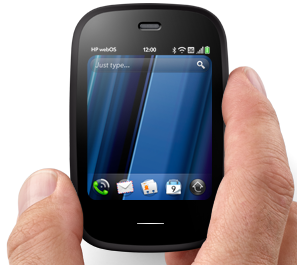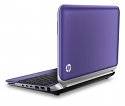HP considers licensing WebOS
Jun 3, 2011 — by Eric Brown — from the LinuxDevices Archive — 1 viewsHP is actively considering licensing its WebOS operating system to other manufacturers, according to industry reports. “It's not correct to believe that [WebOS] should only be on HP devices,” HP CEO Leo Apotheker was said to have told an audience at AllThingsD's D9 conference.
Earlier this week, Microsoft offered an early look at Windows 8, its next-generation, tablet-ready operating system. Now, it faces the prospect of renewed competition from another OS beyond Android and iOS: Hewlett-Packard's Linux-based WebOS. The manufacturer is considering licensing the technology to other manufacturers, just as Google does with Android.
 "I happen to believe that WebOS is a uniquely outstanding operating system," HP CEO Leo Apotheker told an audience at AllThingsD's D9 conference in San Francisco, according to a June 2 Reuters report. "It's not correct to believe that it should only be on HP devices."
"I happen to believe that WebOS is a uniquely outstanding operating system," HP CEO Leo Apotheker told an audience at AllThingsD's D9 conference in San Francisco, according to a June 2 Reuters report. "It's not correct to believe that it should only be on HP devices."
Later, when asked if HP would consider licensing WebOS to others, such as Taiwanese smartphone maker HTC Corp, Apotheker said, "It is certainly something we would entertain." Apotheker was also quoted as saying "WebOS will be adopted by many partners who provide services to small and medium businesses." In addition, Apotheker was said to have expressed regrets at not moving more quickly to develop WebOS products.
Meanwhile, former Palm CEO and HP's current WebOS chief Jon Rubinstein was slightly more circumspect when asked similar questions about potential WebOS licensing at Qualcomm's Uplinq conference on June 1, according to WirelessWeek.
"HP is more than willing to partner with one or two special companies," Rubinstein was quoted as saying during a discussion with journalist Kevin Maney. He went on to tell Maney that HP would be willing to partner with a third party that "brings something special to the ecosystem," says the story.
Later, Rubinstein was quoted as saying WebOS is "not a walled garden," but he would not commit to fully open sourcing the OS, saying that HP was "not in the licensing business." Palm and HP have gradually opened up more code to licensed WebOS developers, but WebOS still can't be considered an open source OS like Android or Chrome OS, let alone the fully open MeeGo.

HP Veer
HP inherited WebOS when it purchased Palm for $1.2 billion in 2010, and the Linux-based operating system was said to be the key to HP's interest in the struggling firm.
While Palm limited use of the OS to its "Pre" smartphones, continued by HP with the new HP Pre 3 and HP Veer models, HP's intentions are much more broad-based. Most immediately, they extend to tablets, such as the upcoming TouchPad (pictured earlier in this story). HP has also said it will offer WebOS on all of its printers that sell for over $100.
 In early March, Apotheker stunned the industry when he said that WebOS would be offered alongside Windows in a dual-boot configuration on all of HP's laptops and desktop PCs starting in 2012. It's unclear, however, whether WebOS will be beefed up to be a full-fledged desktop OS or if it will be deployed as an alternative fast boot OS for quick web access, much the way HP now uses its Linux-based, Splashtop-like QuickWeb software on selected systems such as its Mini 210 netbook (pictured at left).
In early March, Apotheker stunned the industry when he said that WebOS would be offered alongside Windows in a dual-boot configuration on all of HP's laptops and desktop PCs starting in 2012. It's unclear, however, whether WebOS will be beefed up to be a full-fledged desktop OS or if it will be deployed as an alternative fast boot OS for quick web access, much the way HP now uses its Linux-based, Splashtop-like QuickWeb software on selected systems such as its Mini 210 netbook (pictured at left).
If it's more like QuickWeb, adding the prospect of greater integration and syncing with WebOS-based smartphones, tablets, and printers, it might not be seen as quite such a threat to Microsoft. However, if HP is making a bid to establish WebOS as a primary OS — and starts offering its PC customers the option to save money by installing WebOS on its own without Windows — the long-time HP/Microsoft partnership could go the way of "Wintel." (Intel's promotion of MeeGo, as well as more recently, Android and Chrome OS, has certainly not helped relations with Redmond.)
According to the latest data from Net Applications, the various versions of Windows hold an 88.89 percent market share in the combined desktop, laptop, and tablet market, followed by Apple's Mac with 5.39 percent and Apple's iOS (iPad) with 2.38 percent. Linux continues to sit just shy of the one percent mark at 0.91 percent, according to Net Applications' estimation, with the Linux-based Android slightly lower at 0.76 percent.
Microsoft appears to be endorsing HP's cross-device approach for WebOS with its Windows 8, expected to be released in 2012, according to an analysis of Apotheker's comments by Nicholas Kolakowski in our sister publication eWEEK. "Somewhat like WebOS, Windows 8 is expected to scale on devices ranging from tablets to full-size PCs," writes Kolakowski.
Unlike Apple, Microsoft has always depended on outside licensees to push its OS software, but with WebOS's open source underpinnings, HP's real model is Google. Android is offered by countless vendors on a diverse range of devices including smartphones, tablets, handhelds, and set-top boxes.
 Most likely, HP would start by licensing WebOS to companies selling products that are not central to its business — namely smartphones, tablets, and other devices, as opposed to PCs and printers. It is unclear how committed HP is in fighting it out in the crowded smartphone market beyond its modest plans with the Pre 3 (pictured).
Most likely, HP would start by licensing WebOS to companies selling products that are not central to its business — namely smartphones, tablets, and other devices, as opposed to PCs and printers. It is unclear how committed HP is in fighting it out in the crowded smartphone market beyond its modest plans with the Pre 3 (pictured).
The question is whether the computer giant can get many takers in a mobile and embedded market increasingly dominated by Android. However, should Android's many problems — including security issues, fragmentation, Android Market, and more recently, shaky Android 3.x software — catch up with its raging success, HP will be ready with its alternative.
Motorola Mobility CEO Sanjay Jha has been increasingly critical of Google's handling of Android, as in this week's critique of Android Market quality control, so Motorola may be interested in an alternative OS. The company has been rumored, however, to be working on its own web-based OS, a la Chrome OS.
Then again, if Rubinstein's comments are more descriptive than Apotheker's in representing HP's WebOS plans, the company may simply be talking about licensing WebOS to vertical market firms that will customize existing HP-manufactured designs. In any case, the comments give Microsoft, and the tech community at large, something to worry over.
HP's first test of WebOS's "legs" beyond smartphones will be seen in this summer's launch of the TouchPad tablet, which features a 1.2GHz dual-core Qualcomm Snapdragon processor and integration with WebOS smartphones.
According to eWEEK's Don Reisinger in "HP's TouchPad might be iPad's top challenger: 10 reasons why", the TouchPad has a number of advantages over other iPad challengers like the RIM Playbook and a host of Android tablets. These are said to include a solid design, HP's brand and market share, potential PC integration, HP's enterprise clout, and WebOS itself.
This article was originally published on LinuxDevices.com and has been donated to the open source community by QuinStreet Inc. Please visit LinuxToday.com for up-to-date news and articles about Linux and open source.